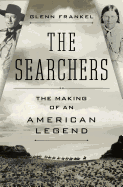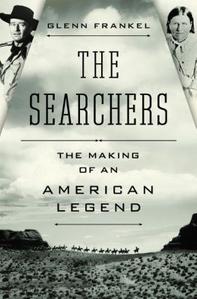

First comes the history: it was a desperate time for the nomadic Comanches in the winter of 1836. Many had died from hunger and disease; they blamed the white settlers. A hunting party raided the Parker family's East Texas ranch, brutally slaughtering five and capturing five, including a nine-year-old "blonde, blue-eyed princess," Cynthia Ann Parker. Her uncle, James Parker, spent the next eight years searching for her. She was raised by the tribe, married a Comanche chief and had children. Twenty-four years later, in 1860, she was "rescued" by the Rangers. She never saw her children again, and never readjusted to the white world. She died in 1870.
Next comes the book. Cynthia Ann Parker's story was one of the most famous captivity narratives, described by Frankel as America's "first indigenous literary genre." Alan Lemay was a successful author of westerns when he discovered her story; he knew he had to write a novel about it. The Searchers was published in 1954 to much acclaim; the film rights were bought by a wealthy businessman who had recently hired Merian C. Cooper as his executive producer. Cooper's other business partner was filmmaker John Ford.
To play Ethan Edwards, the novel's protagonist, Ford cast his favorite actor, his good friend John Wayne, against type as a contemptuous, brutal, racist Indian hater. Ford had just come from a difficult shoot on another picture and was eager to return to Monument Valley, a preferred location for making his westerns. Once the film was written and filmed, Ford cut and pared it down to its essence, a "lyrical ambiguity" weaving "myth and truth into a seamless fabric."
The "relentless ambiguity" of The Searchers "defeats us," Frankel writes. "We honor its ambition and its artistry. But we have no firm sense of what it means nor how truly great and disturbing it is." Similarly, this book is ambitious, and disturbing, and oh so good. --Tom Lavoie
Shelf Talker: A superbly written, highly entertaining mixture of American history and popular culture that reveals anew one of our greatest films.

